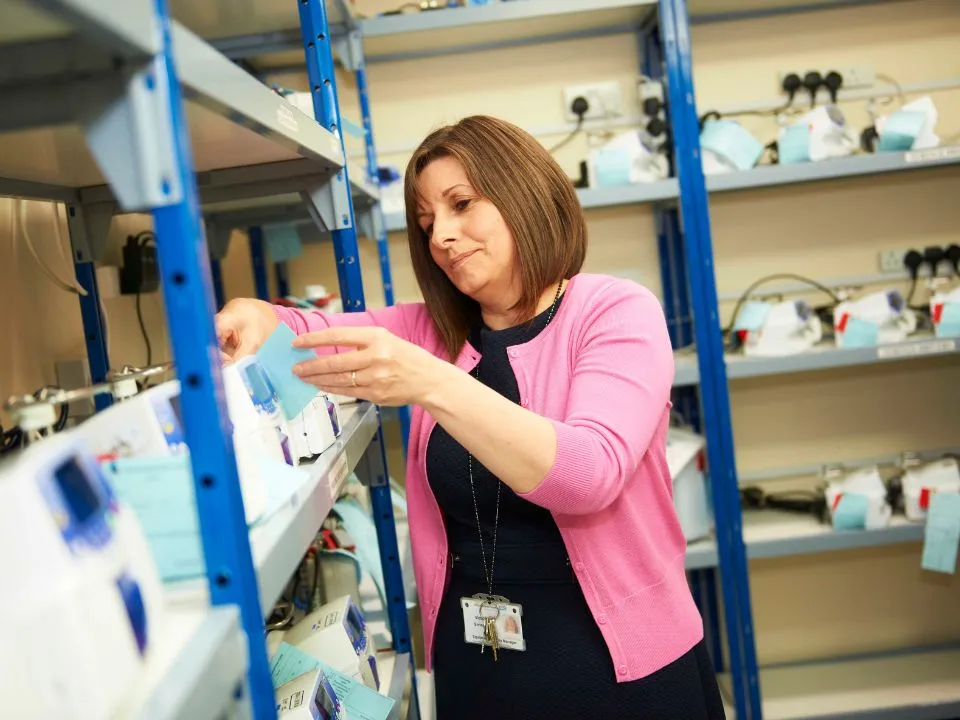Tracking medical devices at Milton Keynes Hospital
Milton Keynes University Hospital NHS Foundation Trust is a modern 500-bed district general hospital in Buckinghamshire, England, that provides a full range of acute services to Milton Keynes and the surrounding areas.
Faced with rising demands of a growing city, the hospital continues to expand its specialist services to local people and is always looking to identify ways to improve efficiency.
The challenge
Prior to the introduction of RFID tracking Milton Keynes Hospital was facing a number of challenges:
- Medical devices were being misplaced and therefore not available for use
- A lot of nursing and technician time was wasted trying to locate equipment
- Nursing staff on wards were keeping spare devices locally which made effective management of equipment more difficult
- There was a need to improve device availability to fulfil the increasing demands of a growing population
The solution
In May 2012, Medical Equipment Library (MEL) Manager Victoria Errington introduced RFID Discovery to track the location of medical devices across the hospital.
Initially, 500 active RFID tags were purchased and attached to mobile devices managed by the medical equipment library. A total of 22 fixed readers were installed across nine key areas of the hospital including A&E, Department of Clinical Care and the medical equipment library. In addition, two mobile handheld RFID readers are used by MEL staff to regularly audit wards where no static readers have been fitted.
Fixed readers are covering the areas where auditing equipment by a clinical engineer with a mobile reader would be impractical, considered intrusive or where a large number of equipment moves are taking place.
How does it work?
Each medical device to be tracked is fitted with an active RFID tag which is firmly attached to the asset. At pre-set intervals the tag transmits a unique ID, which is registered on a central database. Signals are picked up either by fixed readers or by mobile handheld readers in the wards and hospital areas.
Location information is sent back to the RFID Discovery database allowing staff to view the last detected location of each tracked item. This enables the two MEL technicians who are responsible for cleaning the equipment and delivering it to wards to locate devices quickly when they are needed for a patient. Since the introduction of RFID Discovery in Milton Keynes Hospital a total of 1800 devices have been tagged.
The outcome
One of the main benefits of RFID Discovery experienced by Milton Keynes Hospital is the time saved by clinical staff when looking for medical devices, and this means more time is available to look after patients. In addition, for the EBME department, who carry out regular maintenance and repair of medical devices, the tracking solution is helping them achieve their targets for Planned Preventative Maintenance.
The EBME department also looks after all loan equipment such as ultrasound scanners, ECG monitors or bladder scanners. Tracking these devices and when they are leaving the site helps the Trust ensure they are no longer charged for their use.
The RFID Discovery system has also proved invaluable in locating specialist devices which are in short supply such as lifting cushions or bariatric equipment.
With RFiD Discovery it’s considerably quicker to find equipment and it has made meeting our 95% target for Planned Preventative Maintenance (PPM) so much easier. In fact, now we regularly achieve a PPM rate of 97%.

Key Benefits
- More time to look after patients
- Improved efficiency for maintenance
- Increased patient safety
- Better utilization means avoiding the need to purchase new equipment
- Increased confidence in supply of equipment amongst clinical staff


